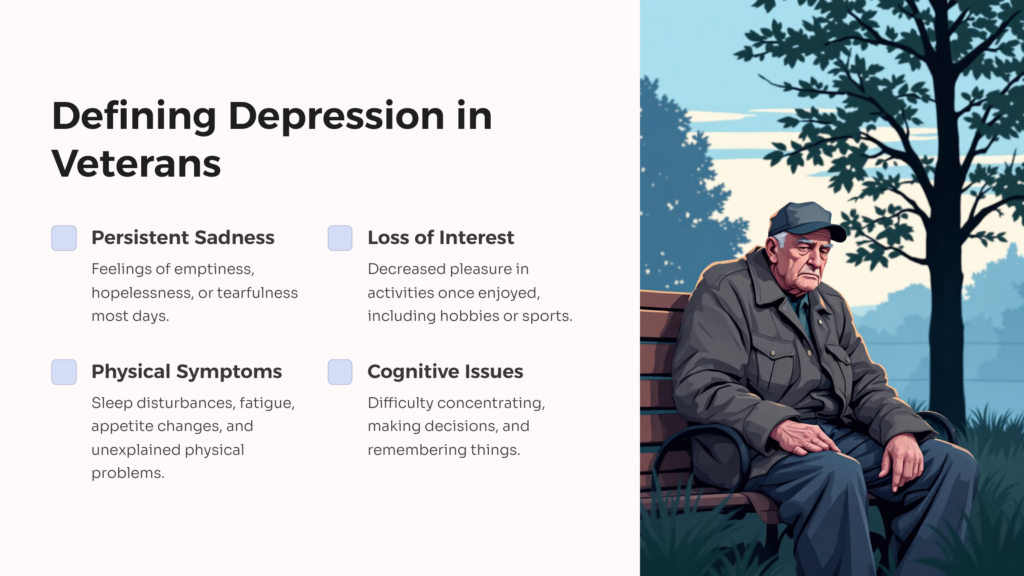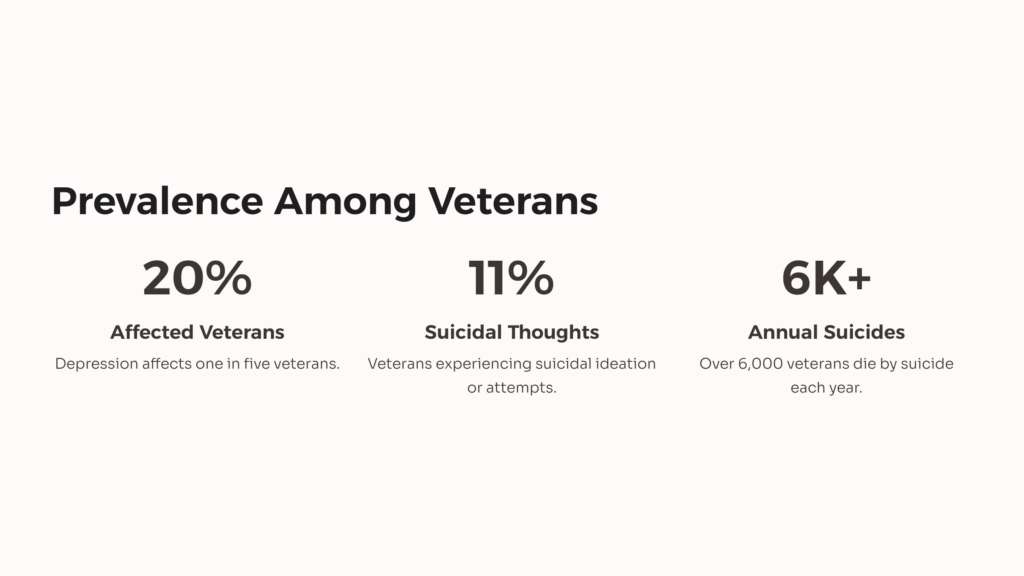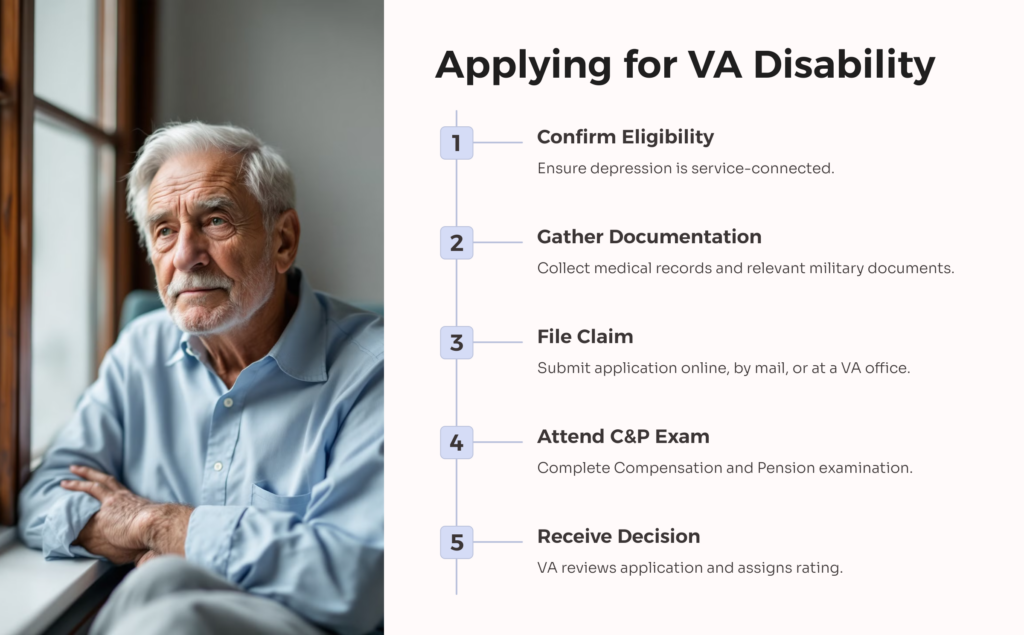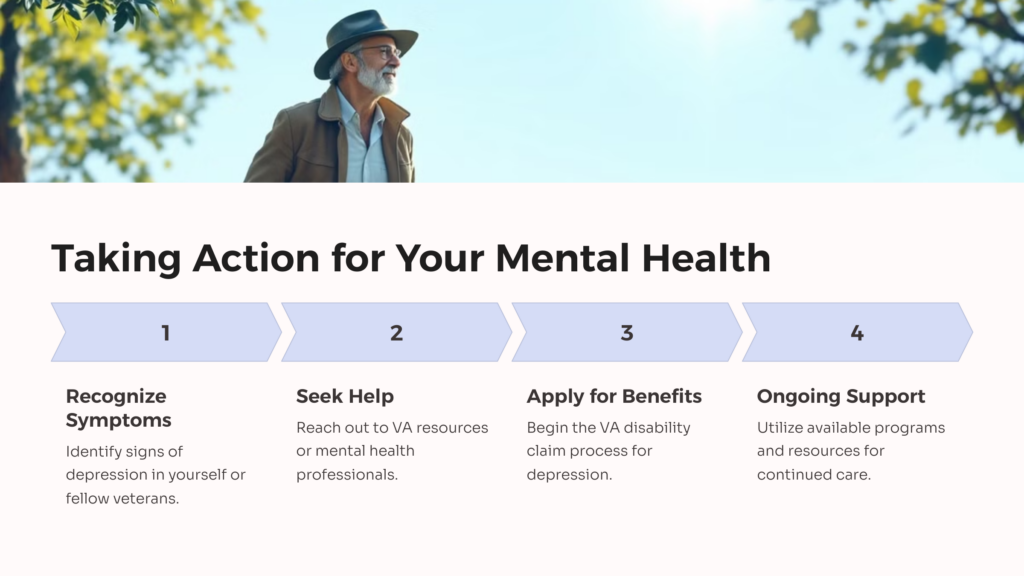VA disability benefits are disability payments given to veterans whose disability was caused or aggravated by their military service. The Department of Veterans Affairs (VA) recognizes depression as a disability. If you suffer from depression and you suspect that it was caused or made worse by your service career, read on.
We will help you understand the VA depression rating criteria and how you can prove you meet the requirements for VA disability payments.
Let’s start by understanding what depression is:
Definition and Symptoms of Depression

Depression, also known as major depressive disorder or clinical depression is a mood disorder characterized by persistent feelings of sadness and loss of interest. Depression negatively affects how you feel, think, and act. It can also cause physical and emotional problems that can make it difficult to function at work and home.
Depression can happen only once in your life. However, for most people, it typically happens in multiple episodes. During these episodes, you may experience the following symptoms most of the day for most days:
- You feel sad, empty, hopeless, or tearful.
- You often have angry outbursts or feel frustrated or irritated even over small matters.
- You lose interest or fail to find pleasure in normal activities such as hobbies you previously enjoyed, sports, or sex.
- You find it difficult to sleep (insomnia) or sleep way more than you should (hypersomnia).
- You feel tired most of the time. You struggle to find the energy to do even small tasks.
- You have a reduced appetite and lose weight as a result or you have an increased appetite that is causing you to gain weight.
- You are anxious, agitated, and restless.
- Your thinking, speaking, and body movements feel significantly slowed.
- You feel worthless or guilty fixate on past failures and blame yourself.
- You have trouble thinking, concentrating, remembering things, and making decisions.
- You suffer from unexplained physical problems such as back pain or headaches.
- You have frequent thoughts of death and suicide.
For you to be diagnosed with clinical depression, your symptoms have to be severe enough to cause noticeable problems in your daily life such as in school, at work, or in your relationships. You should also have experienced these symptoms for at least two weeks and other medical conditions such as a brain tumor, vitamin deficiency, and thyroid problems have to be ruled out.
About 1 in 15 adults experience depression each year and about 16.6% of people will experience clinical depression at least once in their lifetime. Among veterans, the rates are much higher.
Prevalence of Depression Among Veterans

Serving in the military increases your chances of depression. Military life involves significant stressors that can lead to debilitating depression. Unfortunately, the increased risk of depression continues after a person’s military service ends. Veterans who have served in combat have experienced more trauma in their lives than non-veterans.
Here are some statistics that show the prevalence of depression among veterans:
- Depression affects 20% of veterans
- Suicidal attempts or ideations occur in 11% of veterans
- In veterans who use drugs, suicidal ideation occurs at a rate of 1% while attempts climb up to 30%
- In veterans who consume alcohol, suicidal ideation and attempts occur at a rate of %
- Over 6,000 veterans die by suicide each year
- Between 14% to16% of service members deployed to Iraq and Afghanistan are affected by depression and PTSD
The elevated risk of depression among veterans and service members is caused by the stressful military environment including:
- Separation from family and friends deprives active duty military of a solid support system they can rely on
- Experiencing the intense stress of combat
- Constantly seeing themselves and those around them in danger
VA Disability Rating System for Depression
The VA disability rating scale gauges the severity of a veteran’s service-related disabilities and assigns a percentage rating. This rating determines the amount of compensation that you will receive.
For depression, the VA depression rating criteria consider the frequency, severity, and duration of symptoms. It also evaluates your social and occupational functioning. The VA disability rating scale goes from 0% to 100%.
Here are the VA depression rating percentages and what they mean:
0% – This rating means you have no noticeable symptoms of depression. If you fall under this rating, you do not receive any VA disability payments for depression.
10% – This VA disability depression rating means that you have mild symptoms of depression which mildly affect your social and occupational efficiency. Your work and relationships are only affected when you are under severe stress or symptoms. Medication can eliminate and control your symptoms. This might make you eligible for Veterans Health Administration (VHA) coverage but you will not receive any disability payments.
30% – This rating reflects a more significant impairment caused by depression symptoms. You may be unable to fulfill your work-related occasionally. However, most of the time, you can function satisfactorily, take care of yourself, and have normal conversations. At this rating, you may qualify for monthly tax-free compensation.
50% – This rating means that your depression symptoms occur at least a few times a week. You may have panic attacks, impaired judgment, and flattened effects. You may also have difficulty in maintaining social relationships, abstract thinking, understanding complex commands, disturbances in mood and motivation, and impairment of your short-term and long-term memory.
70% – A VA depression rating of 70% means that your depression symptoms are so severe that you struggle in most areas of life. You have a hard time in school and work and your relationships, including family relationships, suffer due to your symptoms. Your judgment is severely impaired, and you might engage in obsessive rituals and suicidal ideation.
100% rating – A VA depression rating of 100% means that you are impaired socially and occupationally. You may experience persistent delusions and disorientation to time and space. Hallucinations and may engage in grossly inappropriate behavior, forgetting the names of close relatives, your occupation, and the names of your pets. You are also considered a danger to yourself and others.
Please note that although your VA mental health depression rating might not qualify you for disability payments, you may still qualify if you have a co-existing mental illness. For example, your VA PTSD with depression rating might be about 70%, making you eligible for disability payments.
If you have total disability as a result of depression, you may qualify for Total Disability based on individual unemployment (TDIU). Applying for a VA TDIU depression rating might help you find out if you qualify. You can also file for TDIU as part of a VA increased depression rating.
Applying for VA Disability for Depression

Applying for VA disability payments is a complex task that involves several steps:
- Confirming eligibility – To be eligible for VA disability benefits, you must be a veteran with a service-connected disability. Your depression must have been caused or aggravated by events that happened during your military service.
- Gather documentation – You must have other medical records, that prove you have been diagnosed and treated for depression. You should also include documents that may offer any relevant information about events in your military career that may have led to your depressive symptoms.
- File claim – You can visit a VA regional office or file your claim online or via mail.
- Compensation and pension exam – Once you file your claim, the VA will schedule a Compensation and Pension exam conducted by a contracted examiner. This exam evaluates the severity of your depression and its impact on your ability to function.
- Decision – Once your application is reviewed, you will receive a VA major depression rating and the corresponding amount of compensation you will receive.
- Appeals – If your claim is denied, you can appeal to the Board of Veteran’s appeal.
Challenges in Obtaining VA Disability for Depression
Obtaining VA disability benefits for depression can be challenging. Here are some of the problems you might encounter:
- Lack of evidence – You might have a hard time proving that your depression is related to your military service. To address this, gather all relevant documents including medical records that prove diagnosis and treatment and statements from medical professionals linking your depression to your military service.
- Credibility issues – The VA might question the credibility of your claim especially if there are gaps in your medical records or they notice inconsistencies in your statements. To avoid this, seek help from a mental health professional who can attest to the impact of your depression.
- Stigma – You might feel reluctant about seeking help or compensation for your mental health issues due to stigma. Despite the stigma involved, you must prioritize your mental health and seek help when you need it. Keep in mind that documentation from a mental health professional can help strengthen your VA disability claims.
Programs and Hep Available for Veterans with Depression
Several programs can help you with your depression and mental health in general. The VA provides several resources to ensure veterans’ mental health is well taken care of. If you are not sure what kind of health you need, call 877-222-8387 to find the right resources for your needs. If you have hearing loss, call TTY: 800-877-8339.
You can also find a VA medical center near you or visit the Veteran Training online self-help portal for overcoming everyday challenges such as anger, and problem solving among others.
Third-party resources such as those provided by all veterans can also go a long way in helping you get compensation for your military-related disabilities.
Final Thoughts

In conclusion, recognizing depression as a disability among veterans is crucial as it validates their experiences, reduces stigma, encourages help-seeking behavior, and reduces stigma. The VA’s evolving policies towards depression suggest a growing understanding of the impact of depression on veteran’s well-being. By paying VA disability payments for depression, the VA ensures that veterans get the financial assistance they need.
If you are a veteran with service-related depression do not hesitate to contact us for more information about VA disability depression ratings and help for filing your claim. You deserve care and support for your service to this nation.
 AllVeteran.com Advisors
AllVeteran.com Advisors
With expertise spanning local, state, and federal benefit programs, our team is dedicated to guiding individuals towards the perfect program tailored to their unique circumstances.











